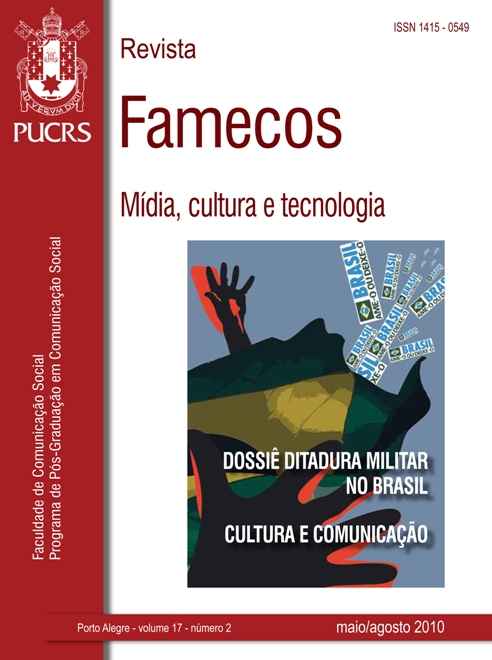The cultural intervention of the cinematographic speech: The meanings of military dictatorship in Brazil
DOI:
https://doi.org/10.15448/1980-3729.2010.2.7544Keywords:
Cultural trauma, cinema, DictatorshipAbstract
After military Brazilian dictatorship in 1964, army force was the law and opposite discourse was silenced. However, in spite of such violent situation, artists reacted and tried, through the cinema, narrate the real Brazilian History. The narrative was constructed based on real stories: people were transposed from their real lives to movies. Drama was perpetuated through movies produced during and after military coup d´état. After 40 years, movies show meanings against the Brazilian official discourse and give to audience a binary association, as a fight between good and evil. Therefore, in order to understand this discussion in Brazilian films, we will make a brief analysis of the production in that period.Downloads
References
ADORNO, Theodor. Indústria Cultural e Sociedade. São Paulo: Paz e Terra, 2002.
ALEXANDER, Jeffrey. C., SMITH, Philip. & SHERWOOD, Steven. J. Risking Enchantment: Theory and Method in Cultural Studies. In: Culture: the Newsletter of the Sociology of Culture, v.08, n.01, p. 10-14, Set. 1993. Disponível em: http://research.yale.edu/ccs/alexander/articles/ Acesso em: 22 set. 2006.
ALEXANDER, Jeffrey. C. & SMITH, Philip. The Strong Program in Cultural Theory: Elements of a Structural Hermeneutics. In: TURNER, J. H. (org). Handbook of Sociological Theory. New York, Kluwer Academics/Plenum Publishers, mar. 2002a. Disponível em: http://research.yale.edu/ccs/alexander/articles/ Acesso em: 22 set. 2006.
ALEXANDER, Jeffrey. C. Towards a Theory of Cultural Trauma. 2002b. Disponível em: http://research.yale.edu/ccs/alexander/articles/ Acesso em: 23 set. 2006.
_____. On the Social Construction of Moral Universals: the ‘Holocaust’ From War Crime to Trauma Drama. In: European Journal of Social Theory, v.5, n.1, p. 5-85, 2002c.
_____. Why Cultural Sociology Is Not ‘Idealist’: a Reply to McLennan. In: Theory, Culture & Society, v.22, n.6, p. 19-29. Periódicos CAPES, 2005.
ALMEIDA, C. H. de & VIANNA, L. F. Memória de Chumbo. Disponível em: www.cinemabrasil.org.br Acesso em: 13 jan. 2007.
BARROS FILHO, Clóvis de. & MARTINO, Luis Mauro Sá. O habitus na comunicação. São Paulo: Paulus, 2003.
FOUCAULT, Michel. A ordem do discurso. São Paulo: Loyola, 1996.
FUNDAÇÃO VICTOR CIVITA. O dia que durou 21 anos. Disponível em: http://novaescola.abril.com.br/especiais/regime_militar/regime_militar.htm Acesso em: 22 set. 2006.
GOFFMAN, Erving. A representação do eu na vida cotidiana. Petrópolis: Vozes, 1975.
_____. Estigma: notas sobre a manipulação da identidade deteriorada. Rio de Janeiro: LTC, 1988.
GOVERNO PROPÕE CRIAÇÃO DE COMISSÃO DA VERDADE SOBRE REGIME MILITAR. Disponível em: http://ultimosegundo.ig.com.br/bbc/2009/12/21/verno+propoe+criacao+de+comissao+da+verdade+sobre+regime+militar+9251571.html Acesso em: 21 jan. 2010.
HABERMAS, Jurgen. Mudança estrutural da esfera pública: investigações quanto a uma categoria da sociedade burguesa. Rio de Janeiro: Tempo Brasileiro, 1984.
JACOBS, M. D. & SPILLMAN, L. Cultural Sociology at the Crossroads of the Discipline. In: Poetics, v.33, n.1, p. 1-14, 2005.
KANE, Anne. Cultural analysis in Historical Sociology: the analytical and concrete autonomy of culture. In: Sociological Theory, v.9, n.1, p. 53-69, 1991.
_____. Reconstructing culture in historical explanation: narratives as cultural structure and practice. In: History and Theory, v.39, n.3, p. 311-330, 2000.
MILAN, Elizabeth. Revista aParte. São Paulo: TUSP, mai-jun 1968.
MELO, Patricia Badeira de. Uma paixão em 8 mm. Recife: UFPE, mimeo, 1990.
MORAES, Dênis. A Esquerda e o Golpe de 64. Rio de Janeiro: Espaço e Tempo, 1989.
PINTO, Leonor Souza. O cinema brasileiro face à censura imposta pelo regime militar no Brasil – 1964/1988. In: CHAGAS, C. M. de F., ROMÃO, J. E. E. & LEAL, S. (Orgs). Classificação Indicativa no Brasil: desafios e perspectivas. Brasília: Ministério da Justiça, 2006.
REZENDE, Sérgio. Zuzu Angel. Brasil: Globo Filmes, Warner Bros, 2006.
SOBRE A ANISTIA E A COMISSÃO DA VERDADE. Disponível em: http://www.cartamaior.com.br/ Acesso em: 21 jan. 2010.
SZTOMPKA, Piotr. Cultural Trauma: the Other Face of Social Change. In: European Journal of Social Theory, v.3, n.4, p. 449-466, 2000.
VENTURI, Toni. Cabra-cega. Brasil: Olhar Imaginário, Europa Filmes, 2004.
XAVIER, Ismail, BERNARDET, Jean-Claude & PEREIRA, Miguel. Os desafios do cinema: a política do Estado e a política dos autores. Rio de Janeiro: Jorge Zahar, 1985.
Downloads
How to Cite
Issue
Section
License
Copyright
The submission of originals to Revista Famecos implies the transfer by the authors of the right for publication. Authors retain copyright and grant the journal right of first publication. If the authors wish to include the same data into another publication, they must cite Revista Famecos as the site of original publication.
Creative Commons License
Except where otherwise specified, material published in this journal is licensed under a Creative Commons Attribution 4.0 International license, which allows unrestricted use, distribution and reproduction in any medium, provided the original publication is correctly cited.






